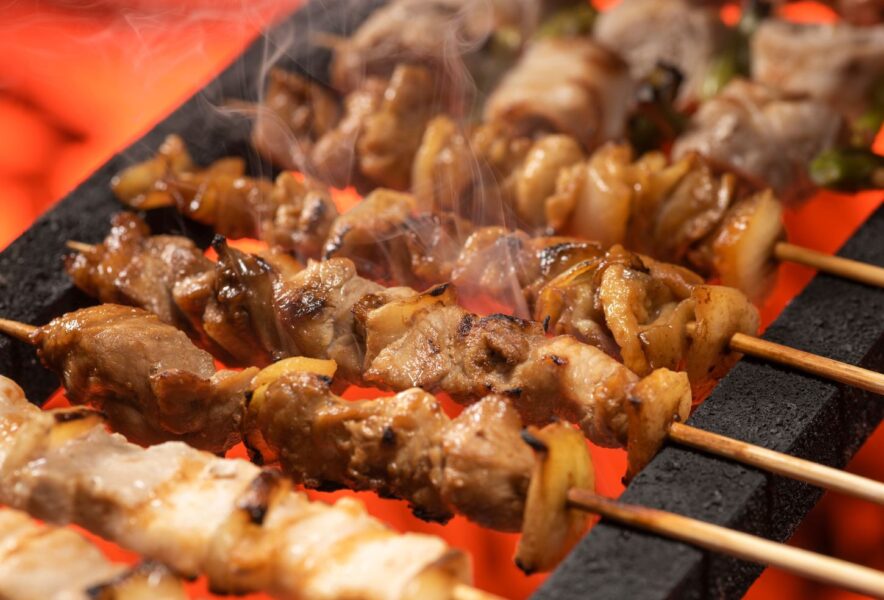Yakitori is one of Tokyo’s most beloved street foods, and its popularity extends from tiny, smoky stalls to upscale izakayas. It’s a simple yet flavorful dish where different parts of the chicken are skewered and grilled to perfection over hot charcoal. Whether seasoned with salt or slathered in a savory tare sauce, these skewers are packed with flavor. In this guide, we’ll explore the best yakitori places in Tokyo, offering both a traditional and modern dining experience.
What is Yakitori? Japan’s Favorite Grilled Chicken
Yakitori is grilled chicken served on skewers, traditionally cooked over charcoal. The beauty of yakitori lies in its simplicity: chicken parts like thighs, wings, liver, and even skin are grilled and seasoned either with tare (a sweet soy-based sauce) or shio (salt). It’s a dish that’s perfect for pairing with a cold beer or sake, making it a staple in Japanese izakayas (pubs). The distinct smoky flavor comes from the use of binchotan charcoal, which gives yakitori its signature taste.
The Different Types of Yakitori: From Thighs to Heart
Yakitori offers a wide variety of cuts and flavors, giving diners a full spectrum of chicken dishes to enjoy. Here are some of the most popular types of yakitori you’ll encounter in Tokyo:
- Momo (Thigh): A classic, juicy option that is typically seasoned with tare or salt.
- Kawa (Chicken Skin): Crispy and flavorful, grilled until the fat renders and the skin is perfectly crunchy.
- Hatsu (Heart): A delicacy for the adventurous, with a tender yet chewy texture.
- Reba (Liver): Rich and creamy, perfect for those who enjoy strong flavors.
- Tsukune (Chicken Meatballs): Ground chicken mixed with seasoning and sometimes dipped in egg yolk for extra richness.
How Yakitori is Cooked: Charcoal Grilling and Seasoning
Yakitori is typically cooked over binchotan, a type of high-quality Japanese charcoal that burns at a very high temperature, giving the meat a perfect sear while keeping it tender inside. The two main seasonings used are tare, a sweet and savory soy-based sauce, and shio, simple salt, which lets the natural flavors of the meat shine. The combination of high heat and these flavorful seasonings results in deliciously smoky, tender chicken skewers.
Best Yakitori Pairings: Sake, Beer, and More
Yakitori is often enjoyed with a drink, making it the perfect izakaya food. The richness of the grilled chicken pairs beautifully with beer, especially light lagers that help to cut through the fattiness of the chicken. For those who prefer Japanese beverages, sake is another excellent choice. Light, dry sake complements the flavors of grilled chicken, while sweeter sakes pair well with salt-seasoned yakitori. Some restaurants even offer wine pairings, with white wines or light reds providing a sophisticated match for certain skewers.
Top Yakitori Restaurants in Tokyo: Where to Savor the Perfect Skewers
Tokyo is home to many outstanding yakitori spots, ranging from Michelin-starred establishments to hidden local gems. Here are a few highly recommended places where you can enjoy the best yakitori in the city:
- Torishiki (Meguro)
Official Website
Torishiki is a Michelin-starred yakitori restaurant known for its precision grilling and top-quality ingredients. The restaurant operates on a reservation-only basis, making it an ideal choice for a special night out. - Yakitori Miyagawa (Akihabara)
Official Website
A long-established yakitori joint, Miyagawa offers a wide selection of chicken parts grilled to perfection. It’s known for its affordable prices and authentic flavors, making it a popular choice for both locals and tourists. - Kushiwakamaru (Shibuya)
Official Website
A lively spot in Shibuya, Kushiwakamaru has a wide menu featuring various cuts of chicken, as well as vegetable and seafood skewers. The cozy atmosphere and quick service make it a great place to hang out with friends. - Torishige (Shinjuku)
Official Website
Torishige specializes in both yakitori and offal, offering rich, flavorful dishes in a casual setting. This long-standing establishment is loved for its generous portions and wide variety of skewers.

Comment